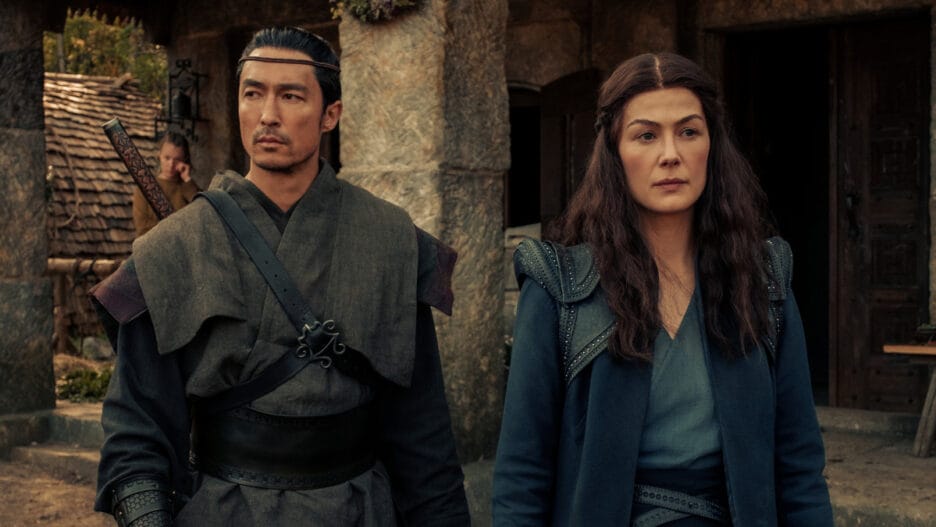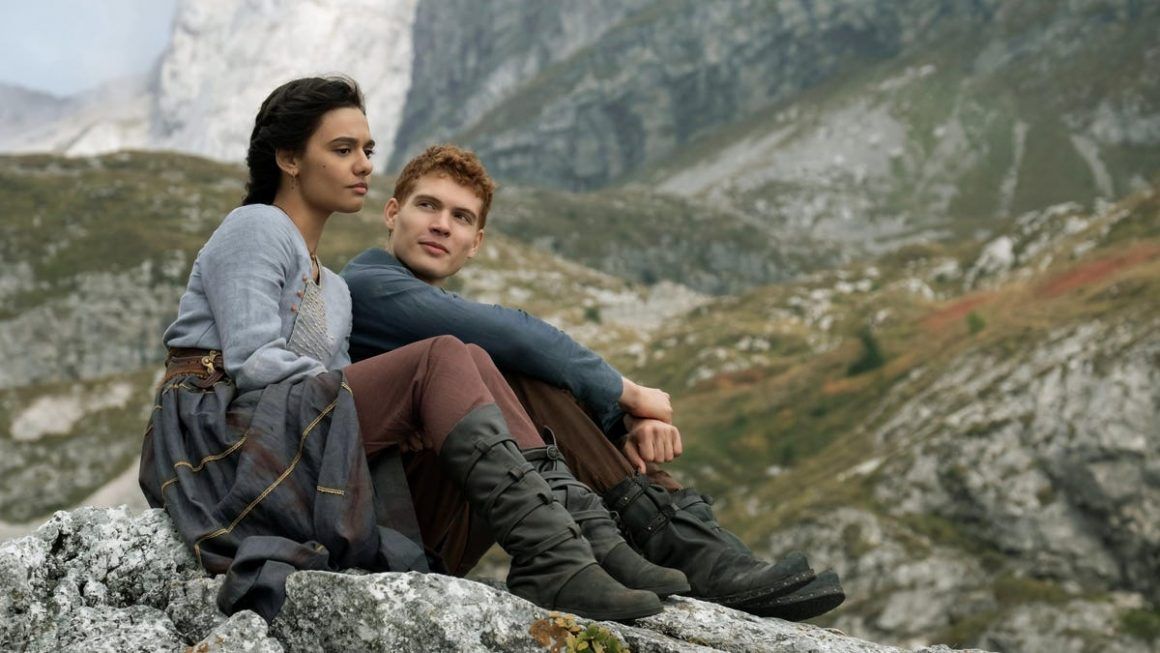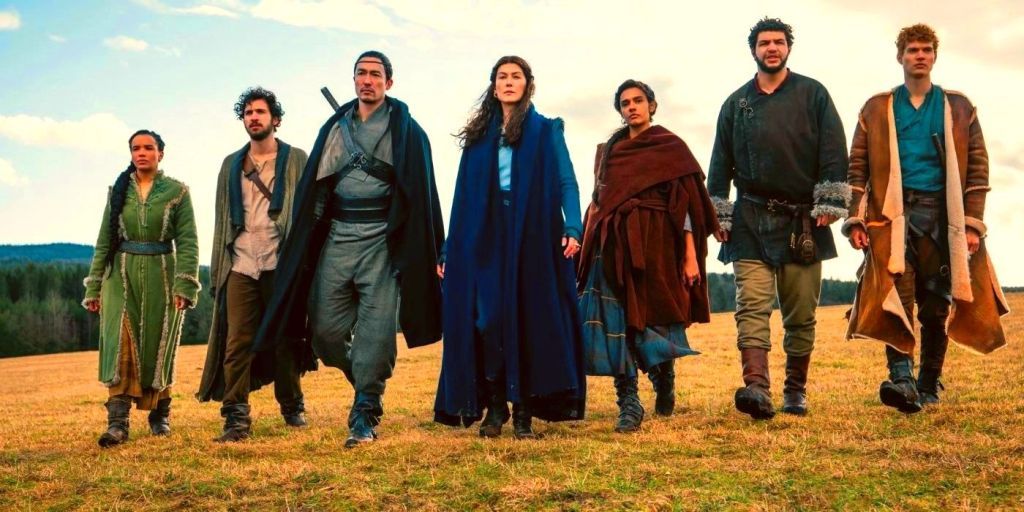
TV REVIEW: Wheel of Time S1E1: “Leavetaking”
As someone who had read the Robert Jordan novels back in the day, The Wheel of Time is a series that I’ve long had conflicted feelings about. To be fair, there’s much to like about the series; Jordan created a fully realized world in his novels, with some interesting characters and compelling ideas. I’m compelled by the idea of the Dragon Reborn, a reincarnated being of great power who could destroy the world or save it. On the other hand, those books also had significant pacing problems, and it was often difficult to keep track of the many characters in the series without referring to the footnotes. Bringing the series to the small screen, then, presents quite a few challenges. The creators of a Wheel of Time show should ideally bring Jordan’s vision faithfully to the screen while also managing the flow of the story better than the novels did.
From Amazon’s perspective, Wheel of Time is perhaps their attempt at creating a Game of Thrones or a Witcher. Fantasy series have proven to work on the small screen when the vision is properly realized, and Wheel of Time certainly has the depth to work as a TV series. There’s too much in these books to work as a film series; each book was a 900-page doorstopper, and the series stretched on for fourteen books until it finally concluded. (In point of fact, the series ended with the passing of Robert Jordan himself, so he never saw the books to their conclusion; fantasy author Brandon Sanderson was brought in to finish the series based on Jordan’s extensive notes.) Game of Thrones, however, shows that you can adapt these kinds of massive fantasy series to television and do them a reasonable amount of justice. So from a business perspective and a creative perspective, there is a certain wisdom in adapting these books for the small screen now.

The approach that Amazon has taken with Wheel of Time is one that I have some respect for. Rather than going for a cast of well-known actors as Game of Thrones did, the show has generally gone for a cast of relative unknowns to play these classic characters. The best known of these is Rosamund Pike as Moiraine Damodred, the Aes Sedai sorceress who plays the mentor role and brings events into motion. The other characters don’t have nearly the same amount of star power behind them, but that also frees them from expectations. The actors have room to work with without those expectations, and they can simply be the characters without being defined by the people in those roles. However, it’s also a risk for Amazon, since star power can draw viewers into a show like this. That puts more pressure on the show to tell a good story, rather than rely on the actors to draw in a viewership.
In practice, the show is loosely adapted from the books, but it is not entirely book-accurate. In this case, that is not necessarily a bad thing, as there are elements that can be improved in the series. The first episode centers on the first hundred or so pages of the first book, which are among the slowest, as that is the setup for the Battle of Two Rivers and the beginning of the adventure. The creators opted to streamline the pacing of that story, while adding more of a sense of a living, breathing village in Two Rivers. At the same time, the series makes certain adjustments to make the younger characters seem older; the blacksmith Perrin has a wife in the show when he never did in the novels, for instance. While I don’t think these inclusions were necessary, they also don’t detract from the story too much either. There are even elements that potentially add character depth; the fate of Perrin’s wife during the battle should be haunting to Perrin as a character and makes his story more interesting. For the most part, though, the setup is true to the books and the setting of the Two Rivers. Where the story does follow Jordan’s outline, it works quite well; it knows what to use and what to leave behind.

This is not to say that the script does so flawlessly. Some scenes in this episode start from a logical premise, but they carry the idea to a questionable conclusion. The idea of showing Egwene al’Vere’s braiding ceremony is a good one, but it leads to Egwene being pushed into the river by Nynaeve, which sounds like an odd and potentially dangerous way to do a coming-of-age ceremony. There are also moments where the dialogue feels more like Tolkien than Jordan, even lifting the occasional line from Lord of the Rings. The occasional nod is fine, and in fairness, Tolkien directly influenced Jordan, as he has with most modern fantasy authors. But the more noticeable references run the risk of taking the viewers out of the experience and reminding them of other things they could be watching. A first episode needs to set the tone for the series, and Jordan has left more than enough material that there’s no need to rely on Tolkienesque dialogue to make the point.
I had questions coming in about the cast, especially given how few of them are recognizable. Still, they all do serviceably well in the roles they’re in, with a couple of them giving very strong starts. Rosamund Pike as Moiraine is easily the anchor of this cast, being the most recognizable actress as well as being one of the most pivotal characters in Eye of the World. Pike grasps the elements of Moiraine—the wisdom, the ladylike grace, and her iron will that borders on ruthlessness. She’s easily the one character who will jump out the most to fans of the books, and Pike does the character justice. Josha Stradowski is a good choice for Rand al’Thor, the main hero of the series, bringing a youthful presence that is reminiscent of a younger Hayden Christensen. Daniel Henney is also a good choice as Lan Mandragoran, Moiraine’s Warder; he brings a firm, stoic quality to Lan that works for that character. Marcus Rutherford is a solid Perrin, presenting a quiet strength to the young blacksmith. Although I never liked Nynaeve as a character, Zoe Robins portrays her faithfully and captures the inner strength of her character. However, the most pleasant surprise of the cast was Barney Harris as Mat Cauthon, who is the most fun to watch of the younger characters. Mat has always been somewhat of a rogue with a heart of gold, very much a gambler, and Harris truly embraces that angle. Overall, while there are not many moments where I felt like the characters walked out of the novel, several of the key performers did well enough that I could embrace them in those roles.

How much you may enjoy the Wheel of Time show may depend on how familiar you are with the novels. If you’re not familiar with the world and characters Robert Jordan created, the episode will give you enough of the basics to start with, even if a few things are glossed over. If you have familiarity with the novels, you may be left with some questions, but the show gets enough right that you can still enjoy what’s on the screen for what it offers. All in all, “Leavetaking” is a reasonable enough start for the show, and it makes a good effort to capture a rich, complex world in its allotted screen time. While I don’t think Wheel of Time is currently as good as the shows Amazon wants to compete with, it’s enjoyable enough and it has room for growth as the show goes on. At present, I’m intrigued enough to see where Amazon takes the series from here.
Score: 4/5
Writer: Rafe Judkins
Director: Uta Briesewitz
Cast: Rosamund Pike, Josha Stradowski, Daniel Henney, Zoe Robins, Madeleine Madden, Barney Harris, Marcus Rutherford, Helena Westerman
Author Profile
- Steve Sellers had been a fan of superheroes ever since Superman: The Movie. But it took the JSA, the Legion of Super-Heroes, Dragonlance, Lord of the Rings, Twilight Zone, and Chris Claremont's legendary run on the X-Men to make him a writer and a longtime fan of comics, fantasy, and science fiction. Steve is the co-creator of WHITE DRUID & MICHAEL NERO and GUARDIANS OF ELAYIM for Omen Comics, and he is also the creator of BLITZ and SHOCKWAVE for Revelation Comics (an imprint of Omen Comics).










